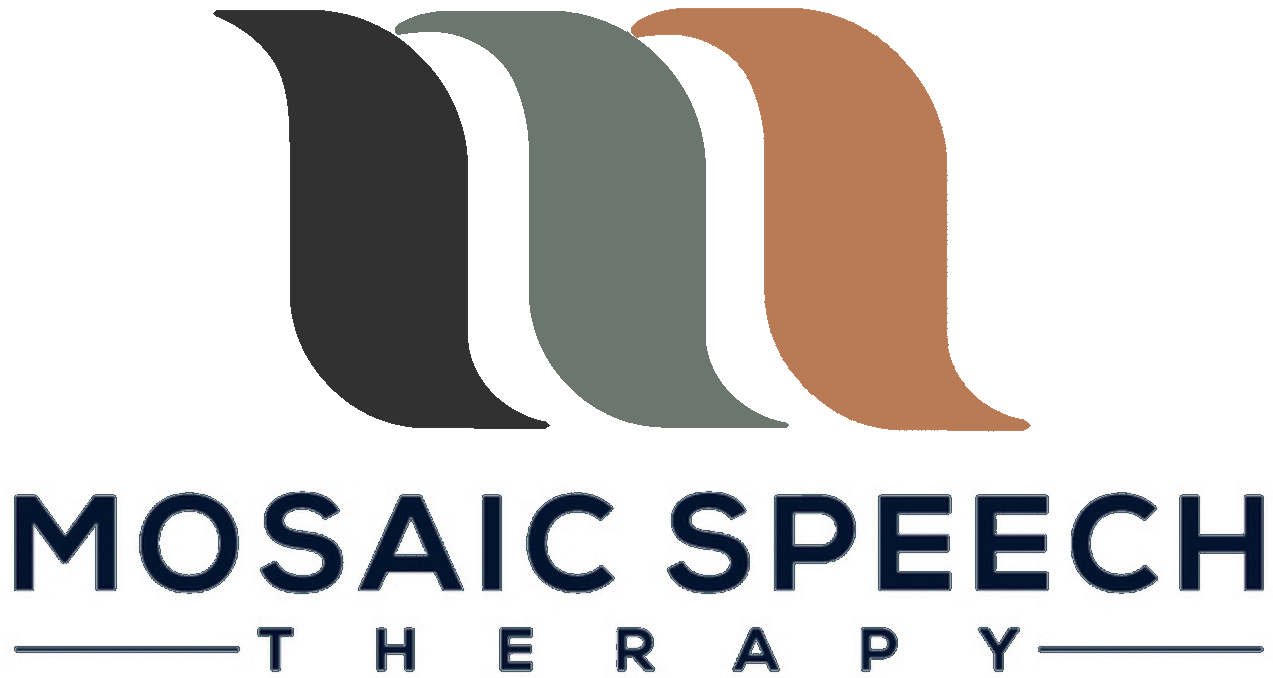Supporting your child’s speech therapy journey doesn’t end at the clinic. By incorporating daily activities and exercises into your routine, you can empower your child to make significant progress and achieve their communication goals.
At Mosaic Speech Therapy in Edmonton, we believe in a holistic approach that combines professional guidance with at-home practice to foster optimal development.

Why Home Support is Crucial
Speech and language therapy requires consistency and practice, and while your child’s therapist plays an essential role in their progress, the time spent in therapy sessions is limited.
Incorporating speech-focused activities and exercises into your child’s daily routine at home allows them to practice in a comfortable and familiar environment. This not only reinforces what they learn in therapy but also helps build their confidence in communicating.
Let’s dive into practical, easy-to-follow strategies that you can implement to support your child’s speech development.
1. Daily Conversations: Make Every Interaction Count
Conversations are the foundation of speech and language development. Make an effort to engage in meaningful dialogue with your child throughout the day. Encourage them to express themselves fully by:
- Asking open-ended questions: Instead of yes or no questions, ask things like, “What did you do at school today?” or “How do you feel about that?”
- Pausing for them to respond: Give your child time to formulate their thoughts and respond, even if it takes longer than usual.
- Expanding on their speech: If your child says, “I want juice,” you can respond, “Oh, you want some apple juice? Sure, let’s pour a glass.”
These techniques help expand vocabulary and sentence structure while giving them confidence in verbal expression.
2. Label Everything in Your Home
A great way to help children with speech therapy is by labeling objects around the house. Labeling helps children connect words with their environment, enhancing vocabulary and comprehension. You can take sticky notes or printed labels and mark items like:
- Doors
- Chairs
- Windows
- Toys
- Books
Each time your child interacts with these objects, point to the label and say the word aloud. Encourage your child to do the same, reinforcing word recognition.
3. Reading Together: Building Vocabulary and Understanding
Reading is one of the most effective ways to boost language development. For children who are working on speech therapy, interactive reading sessions can be extremely helpful. Follow these guidelines when reading with your child:
- Choose books with repetitive phrases or rhymes: These types of books encourage participation and memory.
- Point to pictures as you read: Ask your child to name objects, colors, and actions they see in the illustrations.
- Ask follow-up questions: After reading, ask them to retell parts of the story in their own words or answer questions about the book.
By turning reading into an interactive activity, you create opportunities for speech practice while enhancing their understanding of language.
4. Incorporating Speech Exercises into Playtime

Play is a natural and enjoyable way for children to learn, making it the perfect time to introduce speech therapy exercises. You can practice articulation, phonology, and fluency exercises while engaging in fun, playful activities. Here are a few ideas:
- Role-playing games: Use dolls, action figures, or puppets to act out scenarios that require dialogue. Encourage your child to use clear speech and proper sentence structure.
- Sound scavenger hunt: Create a game where your child finds items that start with a certain sound or letter.
- Sing songs: Singing nursery rhymes or songs that include repetition helps with pronunciation and fluency.
Playtime exercises create a relaxed environment where your child can practice speech without the pressure of a formal setting.
5. Consistent Speech Exercises: Make It a Routine

To see continuous progress, it’s important to make speech exercises a regular part of your child’s day. Work with your child’s speech therapist to identify specific sounds, words, or phrases they need to practice. Then, create a schedule to work on these each day. For instance:
- Spend 10-15 minutes every morning practicing specific sounds.
- After school or during dinner, go through new vocabulary words.
- Set aside time before bed to read together and talk about the day.
By creating a daily routine, your child will get consistent practice and reinforcement of their therapy goals.
6. Consult with Your Child’s Speech Therapist Regularly
At Mosaic Speech Therapy, we encourage parents in Edmonton to work closely with their child’s speech therapist. Regular communication ensures that you’re aware of the areas your child needs to focus on and the progress they are making.
Ask for recommendations on specific exercises and activities that you can do at home to complement your child’s therapy sessions.
By staying engaged with the therapist, you’ll have a better understanding of how to support your child’s journey toward clearer and more confident communication.
At Mosaic Speech Therapy in Edmonton, we’re here to guide you and your child every step of the way. Together, we can make a real difference in their speech and communication skills, both at home and in the world beyond. For personalized assistance, feel free to contact us at info@mosaic-slp.ca or 587-292-0072.

